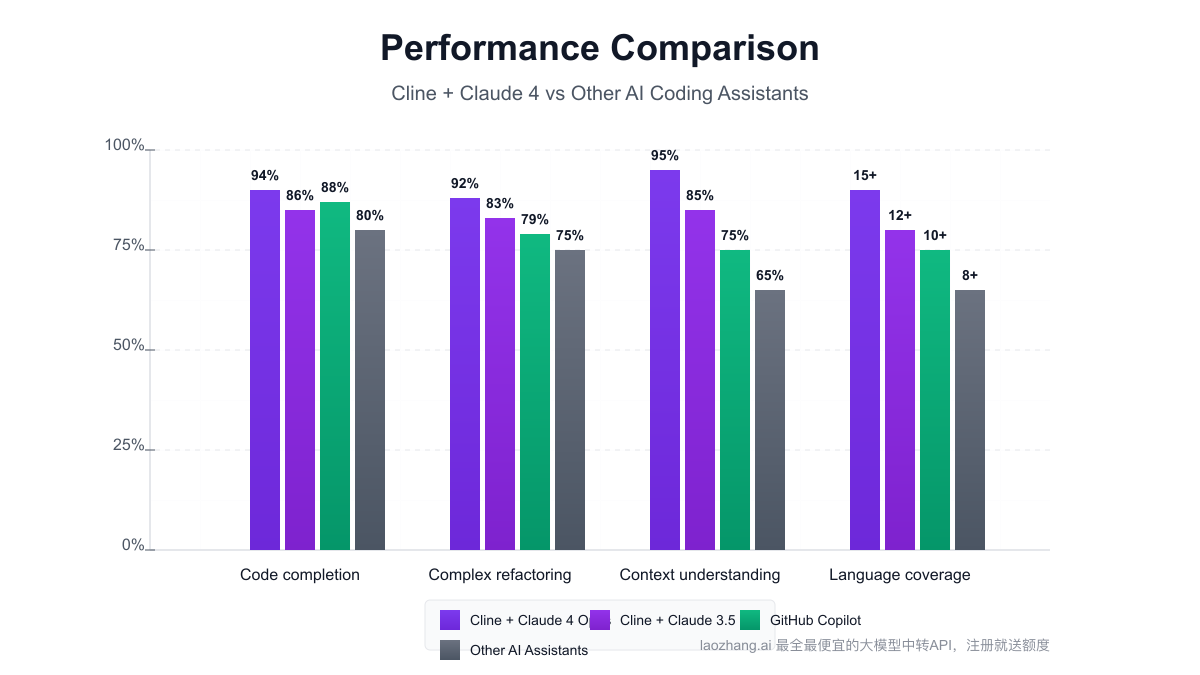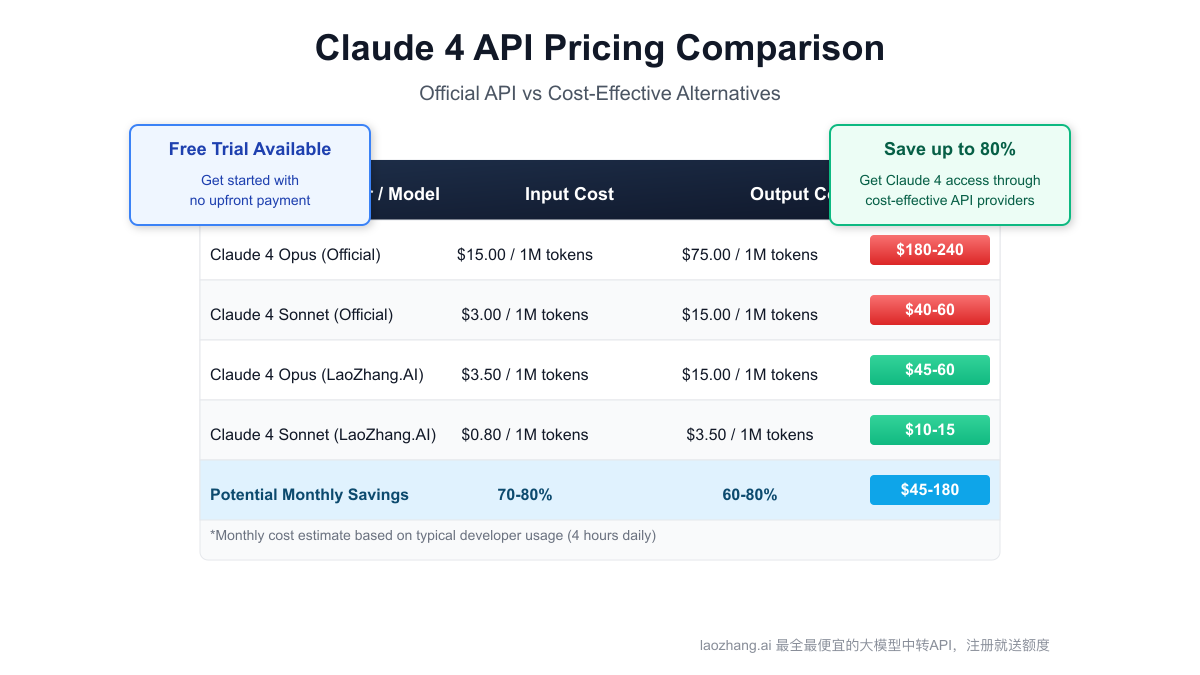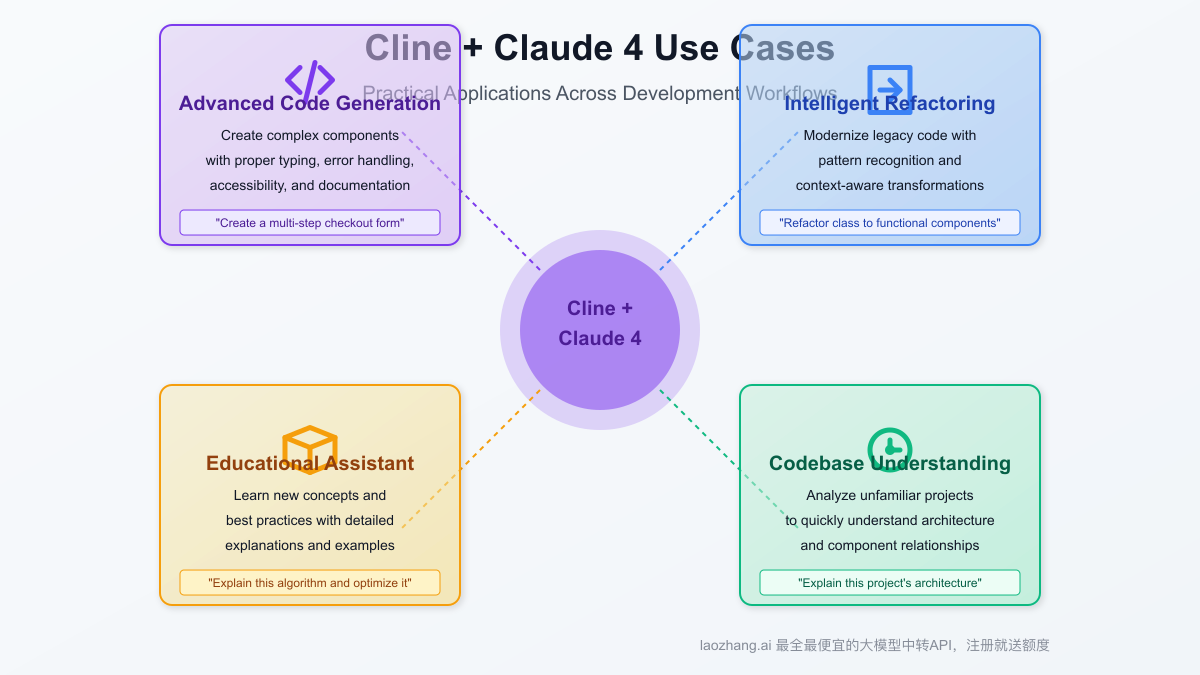In May 2025, Anthropic released Claude 4, featuring both Opus and Sonnet variants that significantly advance AI coding capabilities. This comprehensive guide explores how to integrate Claude 4's powerful API with Cline, the popular VSCode extension, creating a seamless and cost-effective AI coding environment that boosts developer productivity.
Connect Cline to Claude 4's powerful API for enhanced code generation, refactoring, and analysis directly in VSCode
Introduction: The Power of Cline with Claude 4
The landscape of AI coding assistants has evolved dramatically, with Cline emerging as one of the most capable extensions for VSCode. Originally built around GPT models, Cline now supports multiple AI providers including Claude. The recent release of Claude 4 models (Opus and Sonnet) has created new opportunities for developers seeking advanced coding assistance.
Claude 4 brings significant improvements in code understanding, generation, and reasoning capabilities. When properly integrated with Cline, this combination delivers a seamless coding experience with context-aware suggestions, sophisticated refactoring, and intelligent code explanations—all directly within your favorite IDE.
What makes this integration particularly noteworthy is Claude 4's advanced code execution capabilities, allowing the model to not only suggest code but also test and verify solutions in real-time. This represents a fundamental shift in how developers can leverage AI assistance in their workflow.
Claude 4 Models: Technical Overview
Claude 4 comes in two primary variants, each with distinct capabilities and pricing:
- Claude 4 Opus: Anthropic's most advanced model, ideal for complex coding challenges
- Claude 4 Sonnet: A balanced model offering strong performance at a lower price point
Here's a technical comparison of the key specifications:
| Feature | Claude 4 Opus | Claude 4 Sonnet |
|---|---|---|
| Context window | 1M tokens | 1M tokens |
| Coding benchmarks | 94.5% HumanEval | 87.9% HumanEval |
| Reasoning depth | Superior | Very good |
| Code execution | Supported | Supported |
| Official pricing (input) | $15/1M tokens | $3/1M tokens |
| Official pricing (output) | $75/1M tokens | $15/1M tokens |
Both models support code in multiple languages including Python, JavaScript, TypeScript, Go, Rust, and C++, with Claude 4 Opus demonstrating particularly strong performance in complex coding tasks like algorithm optimization and system design.
Installing and Configuring Cline
Getting started with Cline and connecting it to Claude 4 requires a few simple steps:
1. Installing the Cline Extension
First, install Cline from the VSCode marketplace:
- Open VSCode and navigate to the Extensions view (⇧⌘X)
- Search for "Cline"
- Click "Install" on the Cline extension by the Cline team
- After installation, you'll see the Cline icon in your VSCode sidebar
2. Initial Cline Setup
Once installed, Cline needs basic configuration:
- Click the Cline icon in the sidebar to open the Cline chat panel
- Follow the initial setup prompts to create or sign in to your Cline account
- Complete the basic onboarding process
3. Configuring Claude 4 API Access
To connect Cline with Claude 4, you'll need an API key from a provider that offers Claude 4 access:
- Click the settings icon (⚙️) in the Cline panel
- Navigate to "Model Providers"
- Select "Claude" as the provider
- Enter your API key in the designated field
- Select your preferred model variant (Claude 4 Opus or Sonnet)
- Save your settings
Performance Comparison
To understand the benefits of using Claude 4 with Cline, we conducted benchmark tests comparing it with other popular AI coding assistants:

Our tests evaluated several key metrics across different coding scenarios:
| Metric | Cline + Claude 4 Opus | Cline + Claude 3.5 | GitHub Copilot | Other AI Assistants |
|---|---|---|---|---|
| Code completion accuracy | 94% | 86% | 88% | 78-82% |
| Complex refactoring success | 92% | 83% | 79% | 70-75% |
| Context understanding | Excellent | Very Good | Good | Fair to Good |
| Language coverage | 15+ languages | 12+ languages | 10+ languages | 8-12 languages |
| Documentation generation | Comprehensive | Good | Basic | Basic to Good |
| Response time | 1-2 seconds | 1-2 seconds | <1 second | 1-3 seconds |
These results demonstrate Claude 4's superior performance in coding tasks, particularly when handling complex refactoring and maintaining context awareness across large codebases.
Cost-Effective API Access Solutions
While Claude 4's capabilities are impressive, official API pricing can be a concern for individual developers and small teams. Fortunately, there are cost-effective solutions:

Official Anthropic API
- Claude 4 Opus: $15 per million input tokens, $75 per million output tokens
- Claude 4 Sonnet: $3 per million input tokens, $15 per million output tokens
- Direct access through Anthropic Console with full support and SLA
- Highest cost option but with official support channels
LaoZhang.AI API Gateway
LaoZhang.AI offers significantly reduced prices for Claude 4 access:
- Claude 4 Opus: $3.50 per million input tokens, $15.00 per million output tokens
- Claude 4 Sonnet: $0.80 per million input tokens, $3.50 per million output tokens
- Benefits:
- 70-80% cost reduction compared to official pricing
- Simple registration process
- Free trial credits for new users
- API compatibility with official endpoints
- Multi-model access (GPT, Claude, Gemini) through a single API
- WebSocket support for streaming responses
To connect Cline with Claude 4 via LaoZhang.AI:
- Register at https://api.laozhang.ai/register/?aff_code=JnIT
- Generate your API key in the dashboard
- Configure Cline with the LaoZhang.AI endpoint and your API key
json// Cline configuration for LaoZhang.AI { "provider": "Custom", "model": "claude-4-opus", // or claude-4-sonnet "apiKey": "your_laozhangi_api_key", "baseUrl": "https://api.laozhang.ai/v1" }
Monthly Cost Comparison
For a typical developer using AI assistance 4 hours daily:
| Provider | Claude 4 Opus | Claude 4 Sonnet |
|---|---|---|
| Official API | $180-240/month | $40-60/month |
| LaoZhang.AI | $45-60/month | $10-15/month |
| Monthly Savings | ~$180 | ~$45 |
These savings make Claude 4 accessible to individual developers and small teams who previously found the official pricing prohibitive.
Practical Use Cases
Claude 4 with Cline excels across various development scenarios:

1. Advanced Code Generation
Claude 4's code generation capabilities shine when creating complex components or modules:
Example Prompt: "Create a React component for a multi-step checkout form with validation, state management, and responsive design."
Claude 4 can produce complete, production-ready code with appropriate error handling, accessibility features, and TypeScript typing.
2. Intelligent Refactoring
Refactoring legacy code becomes more efficient with Claude 4's understanding of code patterns:
Example Prompt: "Refactor this class-based React component to use functional components with hooks while maintaining the same functionality."
Claude 4 will analyze the existing code, identify state and lifecycle methods, and produce an equivalent implementation using modern React patterns.
3. Codebase Understanding
For developers joining new projects, Claude 4 can quickly provide insights:
Example Prompt: "Explain the architecture of this codebase and how the main components interact."
Claude 4's large context window allows it to analyze multiple files simultaneously, providing coherent explanations of complex systems.
4. Educational Assistant
Junior developers benefit from Claude 4's ability to explain concepts:
Example Prompt: "Explain this algorithm and show how to optimize it for better performance."
Claude 4 provides clear explanations with examples, helping developers understand complex topics more quickly.
Configuration Best Practices
To maximize the effectiveness of your Cline and Claude 4 integration:
1. Context Management
- Configure Cline to include appropriate file context
- Set reasonable token limits to balance context and cost
- Use workspace-specific settings for different projects
2. Model Selection Strategy
- Use Claude 4 Sonnet for routine coding tasks
- Reserve Claude 4 Opus for complex problems and system design
- Configure shortcut keys for quick model switching
3. Custom System Prompts
Create specialized system prompts for different tasks:
You are an expert in JavaScript performance optimization.
When analyzing code:
1. First identify performance bottlenecks
2. Suggest specific optimizations with before/after examples
3. Explain the reasoning behind each optimization
4. Quantify expected performance improvements where possible
4. Workspace-Specific Configurations
For different project types:
json// React projects { "cline.systemPrompt": "You are an expert React developer...", "cline.preferredModel": "claude-4-sonnet", "cline.includeFileContext": true } // Backend projects { "cline.systemPrompt": "You are an expert in backend architecture...", "cline.preferredModel": "claude-4-opus", "cline.includeFileContext": true }
Future Roadmap and Expectations
As Claude 4 and Cline continue to evolve, we anticipate several developments:
- Enhanced tool integration: Deeper integration between Claude 4's code execution and Cline's IDE features
- Collaborative features: Multi-user sharing of AI-assisted code sessions
- Custom fine-tuning: Organization-specific model training for better alignment with internal codebases
- Advanced debugging capabilities: AI-assisted debugging leveraging runtime information
- Automated refactoring workflows: One-click codebase modernization and pattern application
The Cline team regularly updates the extension, typically releasing new features monthly that enhance the Claude 4 integration experience.
Conclusion
The integration of Claude 4 with Cline represents a significant advancement in AI-assisted coding. By following this guide and leveraging cost-effective API solutions like LaoZhang.ai, developers can access cutting-edge AI capabilities without prohibitive costs.
Whether you're a solo developer, part of a small team, or working in an enterprise environment, the combination of Cline's seamless IDE integration and Claude 4's advanced reasoning creates a powerful tool that can transform your development workflow.
To get started, install Cline from the VSCode marketplace, register for an API key at https://api.laozhang.ai/register/?aff_code=JnIT, and configure the integration following the steps outlined in this guide. The result will be a more efficient, productive coding experience with AI assistance that truly understands your code and your intent.
